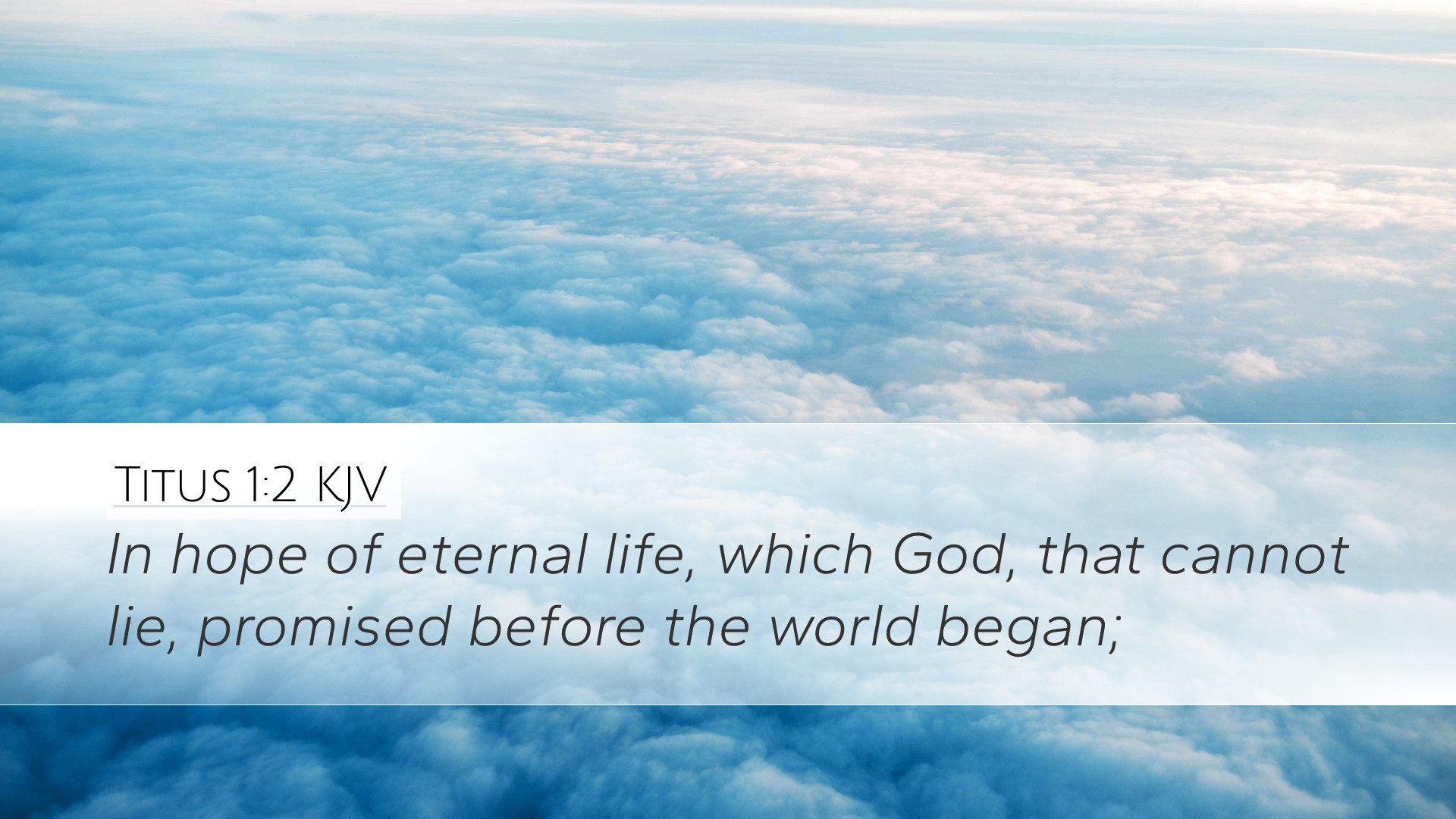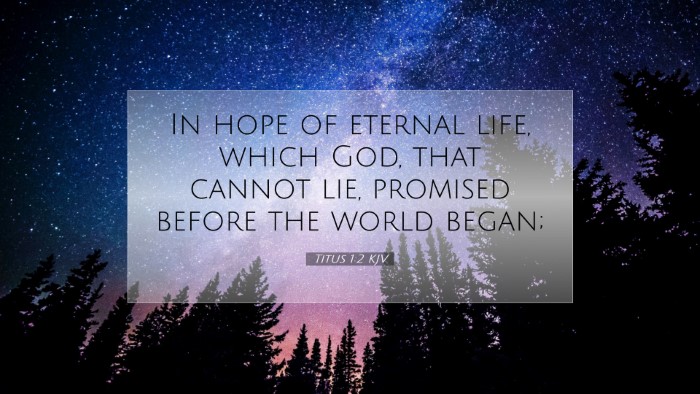Old Testament
Genesis Exodus Leviticus Numbers Deuteronomy Joshua Judges Ruth 1 Samuel 2 Samuel 1 Kings 2 Kings 1 Chronicles 2 Chronicles Ezra Nehemiah Esther Job Psalms Proverbs Ecclesiastes Song of Solomon Isaiah Jeremiah Lamentations Ezekiel Daniel Hosea Joel Amos Obadiah Jonah Micah Nahum Habakkuk Zephaniah Haggai Zechariah MalachiTitus 1:2
Titus 1:2 KJV
In hope of eternal life, which God, that cannot lie, promised before the world began;
Titus 1:2 Bible Commentary
Commentary on Titus 1:2
Titus 1:2: "In hope of eternal life, which God, that cannot lie, promised before the world began."
Introduction
The epistle of Paul to Titus addresses crucial themes of faith, leadership, and the expression of godly conduct within the church. In this particular verse, Titus 1:2, we uncover profound truths about the nature of God's promises and their eternal significance. Commentators such as Matthew Henry, Albert Barnes, and Adam Clarke provide insightful reflections that deepen our understanding of this text.
The Promise of Eternal Life
In Titus 1:2, Paul speaks of "the hope of eternal life," which is central to Christian faith. The concept of eternal life is not just a future promise but also a present reality for believers. Here are key insights from various commentators:
- Matthew Henry: Henry emphasizes that the hope of eternal life is rooted in God's character and faithfulness. He notes that eternal life is both a gift and a promise, showcasing God's grace.
- Albert Barnes: Barnes explains that the hope referred to transcends earthly hopes. It embodies the expectation of unending communion with God, underscoring the transformative power of this hope in the life of a believer.
- Adam Clarke: Clarke adds that this promise of eternal life was made before the world began, affirming God's eternal plan for salvation. He points out that God operates outside of time, ensuring the fulfillment of His promises.
The Nature of God’s Promises
This verse highlights that God "cannot lie," a statement reflecting the immutability of His nature. The implications of this truth are significant:
- Matthew Henry: Henry notes that God's inability to lie assures believers of the reliability of His promises. He reflects on how this truth should cultivate a deep trust in God’s Word.
- Albert Barnes: Barnes elaborates that since God cannot lie, His promises should inspire hope rather than doubt. He encourages believers to rest on the certainty of God's word, which stands unwavering through the ages.
- Adam Clarke: Clarke speaks to the transformational nature of God's promises, asserting that they empower believers to live in accordance with divine will, fueled by the hope of eternity.
Implications for Believers
The realities expressed in Titus 1:2 carry profound implications for the Christian life:
- Assurance of Salvation: The "hope of eternal life" provides believers with assurance amid trials and temptations. Knowing that their destiny is secured in Christ encourages unwavering faithfulness.
- Encouragement in Witness: Believers are called to share this promise with others. The foundational truth that God’s promises are reliable equips the church to boldly proclaim the gospel.
- Motivation for Holy Living: Understanding the eternal nature of God's promise inspires believers to pursue holiness. The anticipation of eternal life motivates them to reflect Christ's character in their daily lives.
Theological Reflections
In theological terms, Titus 1:2 invites us to consider the nature of divine revelation:
- Covenantal Theology: The promise made "before the world began" speaks to the covenant of grace that predates creation. This revelation emphasizes God’s redemptive plan and His unchanging purpose in history.
- Eschatological Hope: The hope of eternal life provides an eschatological lens through which believers understand their present suffering. It compels them to look beyond temporal struggles to the promise of future glory.
- Soteriology: Understanding the promise of eternal life engages with soteriological truths, illustrating that salvation is a work of God, secured by His promise and fulfilled in Christ Jesus.
Conclusion
Titus 1:2 encapsulates the hope and assurance found in Jesus Christ. As elaborated upon by Matthew Henry, Albert Barnes, and Adam Clarke, this verse affirms the permanence of God's promises and the transformative power of His eternal life. For pastors, students, theologians, and scholars, this commentary serves not only as a reflection on a single verse but as a doorway into the rich tapestry of the gospel narrative, urging all to firmly anchor their lives in the truth that our God promises what He fulfills.


